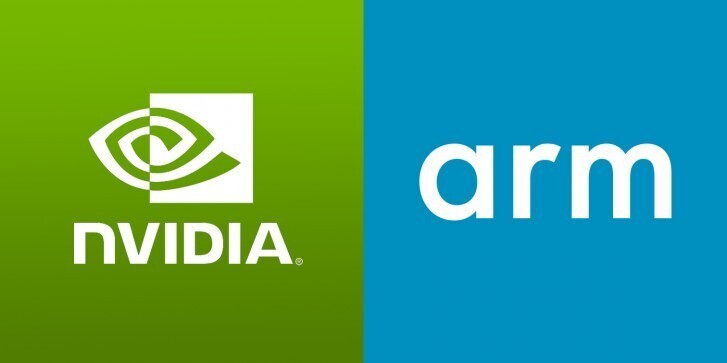hankyoreh
Links to other country sites 다른 나라 사이트 링크
US’ Nvidia announces plans to shake up semiconductor industry by acquiring UK-based Arm

With major upheavals predicted for the global semiconductor industry after the US company Nvidia’s announcement on Sept. 13 that it is to acquire the UK semiconductor design company Arm, the possibility of the deal falling through is rearing its head. Nvidia’s acquisition of Arm would require the approval of antitrust regulation authorities in the US, the UK, China, and the European Union -- with China particularly likely to say no. The UK as well has seen growing public opposition to having one of its cutting-edge businesses acquired by a US company.
China has made no secret of its displeasure. Arm’s acquisition by a US company would effectively give the Donald Trump administration another means of applying pressure as it ramps up its sanctions against Huawei. The US is currently exploring the possibility of sanctions against SMIC -- China’s largest semiconductor foundry businesses -- over links to the Chinese military. China’s state-run Global Times reported on Sept. 15 that “Chinese regulatory authorities may disallow the acquisition because it could place the Chinese semiconductor industry under US control.”
Objections are also surfacing in the UK. At the time of SoftBank’s acquisition of Arm four years ago, the British government insisted on the head office being kept within the country and 1,300 new jobs being created within five years. The anti-trust regulation review process could result in even more stringent conditions than these.
With the semiconductor industry considered a strategic business area in several countries, a number of hurdles must be cleared for mergers and acquisitions to come to pass. In 2016, the US communications chip company Qualcomm announced plans to acquire the Dutch automobile semiconductor company NXP for US$44 billion, but its bid ultimately failed in 2018 after Chinese regulatory authorities denied approval. Qualcomm actually ended up paying US$2 billion in penalties to NXP.
Another potential stumbling block to Nvidia’s acquisition of Arm is the unique standing the British company holds -- regarded within the semiconductor industry ecosystem as a “neutral power” or “public good.” Founded in Cambridge in 1990 by Apple and Acorn Computers, Arm specializes in design, providing architecture for the manufacture of application processors (AP) for smartphones. It holds a monopoly on mobile chip design, accounting for 90% of the market with technology license sales to over 1,000 companies including Apple, Samsung Electronics, Qualcomm, and AMD. It’s a structure that works against it becoming the possession of any one country or company.
On Sept. 15, Bloomberg wrote, “What made the Cambridge, UK-based company so successful was its neutrality. [. . .] Arm licenses its technology to hundreds of companies, while competing with none of them. The Nvidia acquisition threatens this.” Arm clients such as Samsung, Apple, and Qualcomm are all Nvidia competitors -- meaning that the situation is different from the time of the SoftBank acquisition. This explains Nvidia CEO Jensen Huang’s message during the announcement of the Arm acquisition, which stressed that there would be no changes to the existing neutral model. At the time, he explained that because Arm’s profits come from providing semiconductor technology licensing, there would be no reason for it to disadvantage Nvidia’s competitors.
But the market’s take has been circumspect. Lee Seung-woo, an analysis with Eugene Investment & Securities, said, “Realistically, I don’t see the likelihood of either the UK or China approving [the acquisition contract] as high.”
“Given the relations between the US and China, the chances of China simply agreeing to grant approval are very low,” Lee predicted.
By Koo Bon-kwon, senior staff writer
Please direct comments or questions to [english@hani.co.kr]

Editorial・opinion
![[Column] Season 2 of special prosecutor probe may be coming to Korea soon [Column] Season 2 of special prosecutor probe may be coming to Korea soon](https://flexible.img.hani.co.kr/flexible/normal/500/300/imgdb/original/2024/0426/3317141030699447.jpg) [Column] Season 2 of special prosecutor probe may be coming to Korea soon
[Column] Season 2 of special prosecutor probe may be coming to Korea soon![[Column] Park Geun-hye déjà vu in Yoon Suk-yeol [Column] Park Geun-hye déjà vu in Yoon Suk-yeol](https://flexible.img.hani.co.kr/flexible/normal/500/300/imgdb/original/2024/0424/651713945113788.jpg) [Column] Park Geun-hye déjà vu in Yoon Suk-yeol
[Column] Park Geun-hye déjà vu in Yoon Suk-yeol- [Editorial] New weight of N. Korea’s nuclear threats makes dialogue all the more urgent
- [Guest essay] The real reason Korea’s new right wants to dub Rhee a founding father
- [Column] ‘Choson’: Is it time we start referring to N. Korea in its own terms?
- [Editorial] Japan’s rewriting of history with Korea has gone too far
- [Column] The president’s questionable capacity for dialogue
- [Column] Are chaebol firms just pizza pies for families to divvy up as they please?
- [Column] Has Korea, too, crossed the Rubicon on China?
- [Correspondent’s column] In Japan’s alliance with US, echoes of its past alliances with UK
Most viewed articles
- 1‘We must say no’: Seoul defense chief on Korean, USFK involvement in hypothetical Taiwan crisis
- 2Why Kim Jong-un is scrapping the term ‘Day of the Sun’ and toning down fanfare for predecessors
- 3Two factors that’ll decide if Korea’s economy keeps on its upward trend
- 4BTS says it wants to continue to “speak out against anti-Asian hate”
- 5After election rout, Yoon’s left with 3 choices for dealing with the opposition
- 6Gangnam murderer says he killed “because women have always ignored me”
- 7South Korea officially an aged society just 17 years after becoming aging society
- 8AI is catching up with humans at a ‘shocking’ rate
- 9Ethnic Koreans in Japan's Utoro village wait for Seoul's help
- 1046% of cases of violence against women in Korea perpetrated by intimate partner, study finds